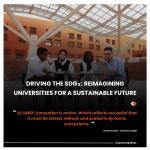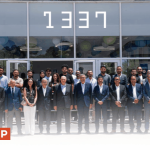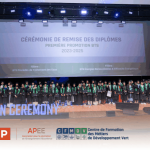Graduation of the First Batch of the "Innovation Hours" Program
Innovation networks are designed to be open and inclusive; they integrate industry representatives into the initial research thinking, and they bring together thinkers, researchers, and innovators to improve industrial products and processes. The concept of the “Innovation Hours” program introduces open innovation to students in a systematic way. In twenty-four weeks, students learned the practical and the theoretical fundamentals of innovation and entrepreneurship, how?
“Innovation Hours” is a hybrid education and incubation program envisioned to become a university transversal course enabling students from several departments to learn and practice innovation and entrepreneurship. The program offers students the opportunity to follow an accredited module in innovation and entrepreneurship while interacting with the industry and proposing their entrepreneurial projects to potential partners. The applied nature of the “Innovation Hours” requires each student to design and launch an innovation project. Such an approach helps students learn by doing and gain real-world experience by testing their products and services with potential clients or partners.
The Philosophy of the “Innovation Hours”
The philosophy of this innovative program is to help students answer fundamental questions about business and management by engaging them in a proactive market test. First, students gain new knowledge about the sector through international speakers from the I&E Lab network. Practitioners, academics and Agritech entrepreneurs and innovators discuss with the class the challenges and solutions emerging in the sector. Then, students design and launch an innovation project following the systematic steps of startup design: a) strategy, b) systematic innovation, c) from ideation to MVP and d) Business Model Canvas. The presentation of a tested minimum valuable product is a must to complete the learning process.
To teach the fundamentals of innovation management and strategic thinking, the program has adopted a modern teaching methodology involving:
a. Flipped classroom.
b. Action learning: application of key concepts and methods via group exercises and exchanges with the industry.
c. Experiential learning: putting the knowledge gained into practice by developing innovation projects in the food and agriculture sector during the 24 weeks of the class.
The First Cohort Restitution Day
In the first cohort of the Innovation Hours, sixteen ESAFE students acquired new knowledge in business, strategy and innovation management and put it into practice through experiential learning. Most of the students created outstanding innovation projects. For example, three innovation projects were set up by students to transform laboratory research into a business. Another innovation project proposed a local solution to the energy shortage on farms using solar panels. Other projects exploit commercial opportunities related to the cultivation of new plants such as mushrooms and stevia in Morocco or bring successful technological solutions from Morocco to other African countries. In general, promising entrepreneurial ideas have emerged and students have shown commitment to bringing their projects to market.
The Restitution Day for the first cohort of Innovation Hours was held on May the 28th. In a hybrid event format, students presented on the university auditorium stage, while the jury and guests joined in remotely. Each student had 15 minutes to present his innovation project and respond to a few questions from the jury panel. The Restitution day was chaired by the instructor of the Innovation Hours Mrs. Bisan Abdulkader, co-founder of the UM6P Innovation & Entrepreneurship Lab.
An international jury composed of partners from the Moroccan ecosystem and international experts participated to the Innovation Hours restitution day. Such jury was composed of Mrs. Laura Lozzi, Open innovation project manager at ENEL, Mrs. Layina, OUDRHINI Innovation director at OUDRHINI, Mr. Adnane ALAOUI SOULIMANI, I&E Lab Manager, Prof. Mohammed Boulif, Head of the ESAFE School, Prof. David HAYES, Entrepreneurship professor at Africa Business School (ABS), Mrs. Sanae ElOUALI BENNIS, Entrepreneurship professor at Al Akhawayn University, Mr. Oussama IHASIKA, Beyonder and Fertilization Innovation Project lead at OCP, Mrs. Nisrine TAHRI, Business Administration Ph.D. student, Mr. Armand TAMAFOUO, Operations manager at U-Founders and Mrs. Kawtar ABOUCHADI, Junior project manager at the I&E Lab. This event offered a unique opportunity for the students to receive feedback and new suggestions regarding their entrepreneurial projects.
The Innovation Hours allowed ESAFE students to put their technical and scientific knowledge into practice, providing them with the necessary tools to create and run their own business in the future. The students of the Innovation Hours went above and beyond to run innovative projects. They were able to understand what it takes to come up with an idea, conduct market research and develop a business plan, before calling in experts. Here are some examples of the projects carried out by the students in the innovation hours:
- Healthy Pocket by Amine KASSAM: A technology based tool that saves money, takes care of everyone's food and at the same time helps the world reduce food waste by getting people to focus on their waste.
- Macro-LIQ by Yahaya Mohammad YUSUF: An innovative formula of liquid organic fertiliser from locally available plant and animal materials to minimise the use of harmful chemicals in fertilisation and pesticides and to stimulate organic farming.
- Sugvia by Abir SAADI: The first locally produced Moroccan stevia that uses government support to give purchasing power to diabetics.
- Octopus by Karim MAKSI: A consultancy company providing agricultural know-how based on expert knowledge and technology for higher productivity and profits
- Mushroom cultivation by Baba KAYINGA: A healthy and nutritious mushroom cultivation and production service in Malawi.
- Strigolac-Inhibitor Ltd By William MAKAZA: An agricultural solution that markets parasitic weed inhibitors for infected fields to ensure sustainable land and crop productivity.
- Jadon Cold Tech by Dominic UKE OBINNA: Modular cold storage for agricultural production of smallholders powered by solar panels.
- Agri-Web by Mohamed BOULLOUZ: A mobile application that provides advice and consulting services from engineers, students, and experts to farmers.
- Irrigation Solutions by Abdul-Latif Jizorkuwie: A transfer of know-how from Morocco to Ghana of efficient technological irrigation systems that provide the necessary quantities of water to farms.
- Fieldview by Lamia JALLA: A new soil analysis technique using a mobile image recognition application.
- DARK-COMP by Bouchra DARKAOUI: An integrated solution for the composting and the recycling of organic waste to enrich the local food production.
_1.png)



